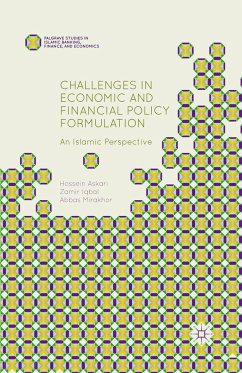"This book has succinctly described the fundamental bases for economic and finance policies required to achieve socio-economic justice as perceived by Islam. It emphasizes rule compliance and risk sharing to attain equitable distribution, financial stability, and financial inclusion. It is thought provoking and exciting as it offers a new policy framework for the present crisis-laden world. It is a groundbreaking publication and hence is a must-read for both experts and novices." - Syed Othman Alhabshi, Chief Academic Officer, INCEIF - The Global University of Islamic Finance, Malaysia
"Askari, Iqbql, and Mirakhor have produced a comprehensive yet accessible guide to the proper role of the state in an economic system designed in accordance with the tenets of Islam. This is a tour de force not only on Islamic teachings on supervisory mechanisms required for taming unfettered markets, but a comprehensive guide to the evolution of thinking on macro- and developmental economics." - Dariush Zahedi, Director, Berkeley Program on Entrepreneurship and Development in the Middle East, University of California, Berkeley, USA
"My congratulations to the authors for their valuable contribution to the subject of Islamic economics and finance. In the aftermath of the global economic and financial crisis there has been an intense debate about the strengths and weaknesses of conventional thinking about economic and financial policy making. While global growth and the explosion of activity in the finance industry has been a welcome sign, there has also been an awakening that market-based economies ought to promote fair and just societies, and for this to happen more reflection is critical on their ideological underpinnings as well as on rules-based management and regulations. In this context, the insights and perspectives offered in this book will benefit conventional thinking and debates, helping others to reflect more deeply on alternate approaches to promoting a fair and just society and a sounder approach to risk-sharing, which is well embedded in the discipline of Islamic economic and finance." - Shamshad Akhtar, Under-Secretary-General of the United Nations and Executive-Secretary of the United Nations Economic and Social Commission for Asia and the Pacific
"Islamic finance has been under the spotlight as one of the mostly discussed items within global economic agenda especially after the 2007 financial crisis. Both the underlying principles of and the tools employed by Islamic finance can contribute to the reduction of systemic risks and to the reshaping of the global financial architecture during the post-crisis era. This book, as a masterpiece in its area fills a big gap and provides insight to policy makers, practitioners and academicians by presenting a well-established framework of macroeconomic policy from an Islamic finance point of view." - Ibrahim M. Turhan, CEO, Borsa Istanbul, Turkey
"Askari, Iqbql, and Mirakhor have produced a comprehensive yet accessible guide to the proper role of the state in an economic system designed in accordance with the tenets of Islam. This is a tour de force not only on Islamic teachings on supervisory mechanisms required for taming unfettered markets, but a comprehensive guide to the evolution of thinking on macro- and developmental economics." - Dariush Zahedi, Director, Berkeley Program on Entrepreneurship and Development in the Middle East, University of California, Berkeley, USA
"My congratulations to the authors for their valuable contribution to the subject of Islamic economics and finance. In the aftermath of the global economic and financial crisis there has been an intense debate about the strengths and weaknesses of conventional thinking about economic and financial policy making. While global growth and the explosion of activity in the finance industry has been a welcome sign, there has also been an awakening that market-based economies ought to promote fair and just societies, and for this to happen more reflection is critical on their ideological underpinnings as well as on rules-based management and regulations. In this context, the insights and perspectives offered in this book will benefit conventional thinking and debates, helping others to reflect more deeply on alternate approaches to promoting a fair and just society and a sounder approach to risk-sharing, which is well embedded in the discipline of Islamic economic and finance." - Shamshad Akhtar, Under-Secretary-General of the United Nations and Executive-Secretary of the United Nations Economic and Social Commission for Asia and the Pacific
"Islamic finance has been under the spotlight as one of the mostly discussed items within global economic agenda especially after the 2007 financial crisis. Both the underlying principles of and the tools employed by Islamic finance can contribute to the reduction of systemic risks and to the reshaping of the global financial architecture during the post-crisis era. This book, as a masterpiece in its area fills a big gap and provides insight to policy makers, practitioners and academicians by presenting a well-established framework of macroeconomic policy from an Islamic finance point of view." - Ibrahim M. Turhan, CEO, Borsa Istanbul, Turkey









